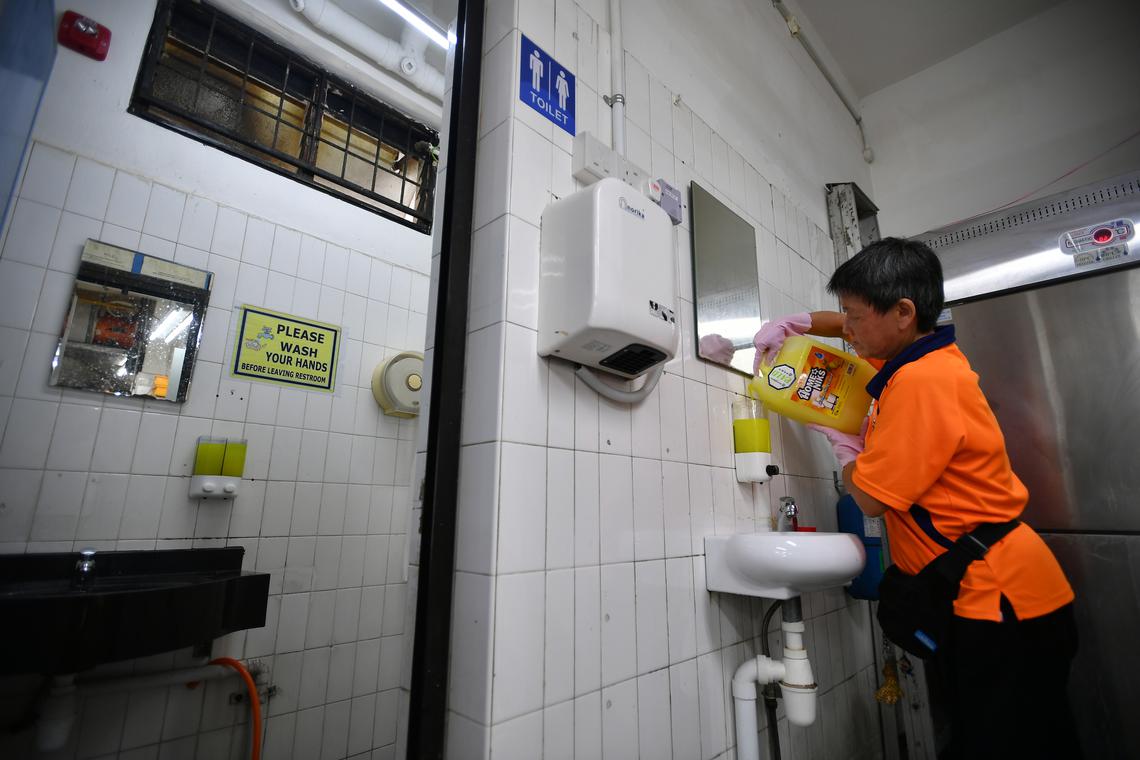S’pore coffee shops can tap $10m in grants to boost toilet cleanliness
Sign up now: Get ST's newsletters delivered to your inbox

Coffee shop operators can apply for up to 95 per cent funding for toilet renovation costs, capped at $50,000 per coffee shop.
PHOTO: ST FILE
SINGAPORE – Coffee shop owners can soon tap $10 million from two grants to improve the cleanliness of the toilets at their premises.
Under a new $5 million Coffee Shop Toilet Renovation Grant, operators can apply to the National Environment Agency (NEA) for up to 95 per cent funding for costs, capped at $50,000 per coffee shop.
The grant aims to encourage operators to undertake renovations and achieve certification under an upcoming Happy Toilet Programme standard for coffee shops.
The standard will be developed by the Restroom Association (Singapore) (RAS) – a non-profit organisation which aims to build an “excellent restroom culture”.
Operators will also be able to tap NEA’s $5 million Coffee Shop Toilet Deep Cleaning Grant, for funding of up to 95 per cent of the cost of a two-year deep cleaning contract, capped at $25,000 per coffee shop.
“Successful grant applicants will also receive complimentary on-site toilet cleaning training at their coffee shops for in-house cleaners,” said the Ministry of Sustainability and the Environment (MSE) on March 4.
NEA will provide more details of the two grants later in 2025, the ministry added.
The two grants were among 10 recommendations by the Public Toilets Task Force
Responding to questions by various MPs – including Ms Poh Li San (Sembawang GRC) and Mr Gan Thiam Poh (Ang Mo Kio GRC) – about whether these recommendations would be implemented, Minister for Sustainability and the Environment Grace Fu said her ministry had studied the task force’s recommendations and decided to endorse them.
Co-chaired by Senior Parliamentary Secretary for Sustainability and the Environment Baey Yam Keng and Public Hygiene Council (PHC) chairman Andrew Khng, the task force was convened in 2024 to study and recommend solutions to improve the cleanliness of public toilets.
These included a list of recommended design features, such as placing toilet entrances and common hand wash basins at least 5m away from the nearest food stall where possible.
The task force focused primarily on restrooms that consistently fared poorly in cleanliness surveys, such as those at coffee shops and hawker centres.
A study by Singapore Management University of 2,602 public toilets islandwide in 2024 found coffee shop toilets to be among the dirtiest.
Speaking in Parliament on March 4 during the debate on his ministry’s budget, Mr Baey acknowledged that coffee shops are privately operated commercial premises.
But as “natural gathering points” for residents, they provide a public service to the community by keeping their toilets accessible both to patrons and other members of the public, reducing the need for the Government to build public toilets in the community.
“This is particularly important in an ageing population, as seniors may have more difficulties in managing bladder and bowel control,” he noted.
In a statement, MSE noted that coffee shops had high footfall but often faced “limited manpower in cleaning and maintaining the toilets”.
Responding to a question from Ms Hany Soh (Marsiling-Yew Tee GRC) on whether similar grants would be extended to other public restrooms – such as those at community clubs or neighbourhood centres – Mr Baey said the focus is on coffee shop toilets due to how poorly they fared in cleanliness surveys.
Diverting resources to other premises would not address the issue at hand, he added.
The year-long Toilet Improvement Programme for coffee shops, which ended in October 2021, co-funded operators up to 90 per cent of the cost of improving the design of toilets or adopting technology to facilitate their cleaning and maintenance, capped at $45,000.
Only 44 coffee shops out of more than 1,000 islandwide completed improvement works under the programme.
Relying on grants alone is not enough, Mr Baey said, adding that users and community volunteers can also contribute to cleaner toilets.
In line with this, MSE endorses the task force’s recommendation to refresh RAS’ existing Happy Toilet Programme – a grading initiative for public toilets focused on areas such as cleanliness and user satisfaction – as well as the expansion of PHC’s Neighbourhood Toilets Community Group programme. The PHC initiative aims to educate operators and users about the shared responsibility of keeping public toilets clean.
Mr Baey added that the authorities will continue to take action against errant operators, including suspensions where necessary.
He noted that the Singapore Food Agency (SFA) and NEA in 2024 intensified inspections on public toilet cleanliness, with almost 19,000 such inspections carried out. These resulted in about 1,300 enforcement actions taken against premises’ owners and managers.
“I am heartened that premises have taken action to rectify lapses,” said Mr Baey. “Over time, we hope that these measures can break the cycle of dirty coffee shop toilets, so that we all can enjoy better and cleaner toilets.”
In February, it was reported that six coffee shops were fined and suspended for a day for toilet-related lapses.


